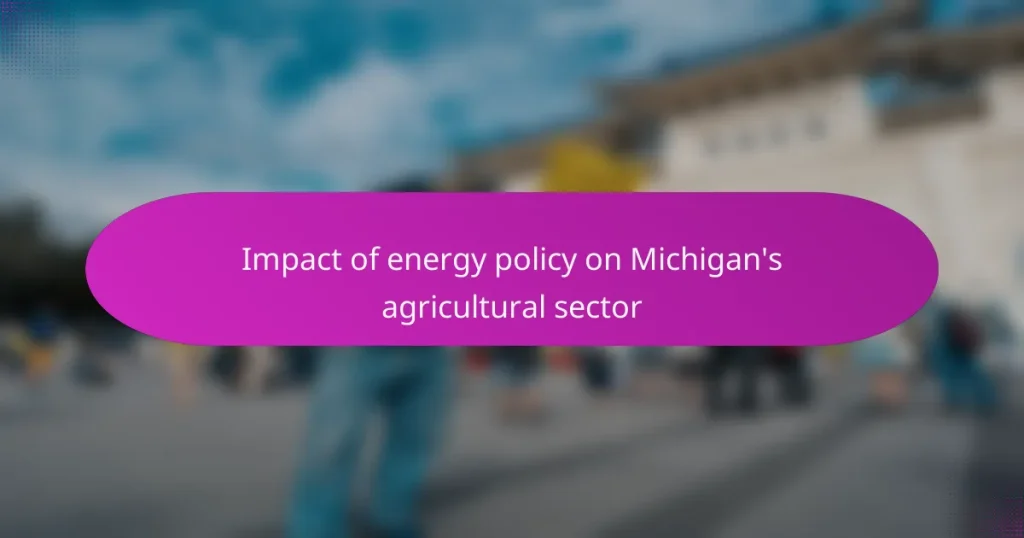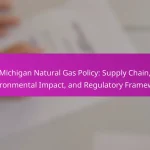
What is the impact of energy policy on Michigan’s agricultural sector?
Energy policy significantly impacts Michigan’s agricultural sector. Policies that promote renewable energy can lower production costs for farmers. For instance, solar energy installations can reduce electricity expenses. Additionally, energy efficiency programs can enhance productivity in agricultural operations. Conversely, policies that increase fossil fuel prices may raise operational costs. This could lead to reduced profit margins for farmers. According to the Michigan Department of Agriculture, energy costs account for about 10% of total farm expenses. Thus, energy policy directly influences the financial viability of agricultural enterprises in Michigan.
How do energy policies influence agricultural practices in Michigan?
Energy policies significantly influence agricultural practices in Michigan by promoting sustainable farming techniques. Policies incentivize the use of renewable energy sources, such as solar and wind, on farms. For example, the Michigan Renewable Energy Standard mandates that utilities obtain a portion of their energy from renewable sources. This encourages farmers to invest in solar panels for electricity.
Additionally, energy efficiency programs help farmers reduce operational costs. These programs provide financial assistance for upgrading equipment and improving energy use. Research from the Michigan State University Extension highlights that energy-efficient practices can lead to substantial savings for farmers.
Furthermore, state policies support bioenergy production from agricultural waste. This creates new revenue streams for farmers while reducing waste. Overall, energy policies shape the agricultural landscape in Michigan by fostering innovation and sustainability.
What specific energy policies are currently affecting Michigan agriculture?
Current energy policies affecting Michigan agriculture include the Renewable Portfolio Standard (RPS) and the Clean Energy Plan. The RPS mandates that 15% of electricity must come from renewable sources by 2021. This policy encourages the use of solar and wind energy in farming operations. The Clean Energy Plan aims to reduce carbon emissions and increase energy efficiency. It promotes sustainable practices among farmers. Additionally, the state offers incentives for adopting energy-efficient technologies. These policies impact operational costs and energy consumption for agricultural producers.
How do these policies shape farmers’ energy consumption choices?
Energy policies significantly influence farmers’ energy consumption choices. These policies often provide incentives for renewable energy adoption. For instance, tax credits for solar installations can encourage farmers to invest in solar panels. Additionally, regulations may mandate energy efficiency improvements in agricultural practices. This can lead farmers to adopt energy-saving technologies. Programs that offer grants for energy-efficient equipment also shape consumption patterns. Furthermore, state-sponsored educational initiatives inform farmers about sustainable practices. The cumulative effect of these policies is a shift towards more sustainable energy use in agriculture.
Why is energy policy important for Michigan’s agricultural sector?
Energy policy is important for Michigan’s agricultural sector because it directly influences production costs and sustainability practices. The agricultural sector relies heavily on energy for machinery, irrigation, and transportation. Fluctuations in energy prices can significantly impact the profitability of farms. For instance, the U.S. Energy Information Administration reported that energy costs account for approximately 10 to 15 percent of total farm operating expenses. Furthermore, energy policies that promote renewable energy sources can enhance sustainability. Michigan’s agricultural sector can benefit from incentives for solar and wind energy installations. These policies can lead to reduced greenhouse gas emissions and long-term cost savings for farmers. Overall, effective energy policy shapes the economic viability and environmental impact of agriculture in Michigan.
What economic implications arise from energy policy changes?
Energy policy changes can significantly impact economic factors such as production costs, market stability, and investment in innovation. For instance, shifts towards renewable energy can lower long-term operational costs for agricultural producers. This transition may also create new job opportunities in the renewable sector.
Moreover, energy policy changes can influence commodity prices. For example, increased energy costs can lead to higher prices for fertilizers and transportation, affecting overall agricultural profitability. According to a 2020 study by the U.S. Department of Agriculture, energy policy adjustments can lead to a 10-15% variation in production costs for farmers.
Additionally, energy policies that promote sustainability can enhance market access for Michigan’s agricultural products. Consumers increasingly prefer sustainably sourced goods. Therefore, aligning energy policies with environmental goals can open new markets and improve economic resilience for farmers.
How do energy policies affect sustainability practices in agriculture?
Energy policies significantly influence sustainability practices in agriculture by shaping resource availability and usage. These policies can promote renewable energy sources, which reduce reliance on fossil fuels. For example, subsidies for solar panels on farms can lead to lower energy costs and decreased greenhouse gas emissions. Additionally, energy efficiency regulations encourage farmers to adopt technologies that minimize energy consumption. Research shows that states with supportive energy policies see increased investment in sustainable practices. In Michigan, such policies have led to a rise in agrivoltaics, where crops are grown alongside solar panels, optimizing land use. Overall, energy policies drive innovation and investment in sustainable agricultural practices.

What are the key components of energy policy in Michigan?
The key components of energy policy in Michigan include renewable energy standards, energy efficiency programs, and regulatory frameworks. Michigan’s energy policy mandates that 15% of electricity must come from renewable sources by 2021. The state promotes energy efficiency through various programs aimed at reducing consumption. Regulatory frameworks guide the development and integration of energy resources. Additionally, the policy supports investments in clean energy technologies. These components aim to enhance energy security, reduce greenhouse gas emissions, and promote economic growth.
What types of energy sources are utilized in Michigan agriculture?
Michigan agriculture utilizes several types of energy sources. These include fossil fuels, electricity, renewable energy, and biomass. Fossil fuels, such as diesel and gasoline, are commonly used for machinery and transportation. Electricity powers irrigation systems, heating, and cooling in agricultural facilities. Renewable energy sources, like solar and wind, are increasingly adopted for sustainable farming practices. Biomass energy, derived from organic materials, is used for heating and power generation. The diversification of energy sources helps enhance efficiency and sustainability in Michigan’s agricultural sector.
How do renewable energy sources compare to traditional sources in farming?
Renewable energy sources offer sustainability advantages over traditional energy sources in farming. They reduce greenhouse gas emissions significantly. For example, solar and wind energy produce no emissions during operation. In contrast, fossil fuels contribute to air pollution and climate change. Renewable energy can lower operational costs over time. Studies show that farms using renewable energy can save up to 50% on energy costs. Additionally, renewable energy enhances energy security for farms. It decreases reliance on fluctuating fossil fuel markets. In Michigan, policies encouraging renewable energy adoption have boosted local farming resilience. This shift supports both economic and environmental goals in the agricultural sector.
What role do government incentives play in energy source adoption?
Government incentives significantly boost energy source adoption. They provide financial support, making renewable energy solutions more accessible. Programs like tax credits and grants lower initial costs for farmers. This encourages investments in solar, wind, and bioenergy technologies. In Michigan, incentives have led to increased adoption rates. For instance, the Michigan Renewable Energy Standard mandates a portion of energy from renewable sources. This policy framework has spurred growth in the agricultural sector. Farmers are motivated to transition to sustainable practices due to these incentives. Consequently, government incentives play a crucial role in facilitating energy transitions.
How do energy policies impact agricultural productivity in Michigan?
Energy policies significantly impact agricultural productivity in Michigan. These policies influence the availability and cost of energy sources for farming operations. For instance, renewable energy incentives can lower energy costs for farmers. This reduction allows for increased investment in equipment and technology. Additionally, energy policies can promote energy efficiency in agricultural practices. Improved efficiency leads to higher yields and reduced operational costs. A study by the Michigan State University Extension found that energy-efficient practices can increase productivity by up to 20%. Furthermore, policies supporting bioenergy can create new markets for agricultural products. This diversification can improve farmers’ income stability and resilience. Overall, energy policies shape the economic landscape for agriculture in Michigan.
What are the effects of energy costs on crop yields?
Energy costs significantly affect crop yields. Higher energy prices increase the cost of production for farmers. This leads to reduced investment in essential inputs like fertilizers and irrigation. Consequently, crop yields may decline due to insufficient resources. For instance, a study by the USDA indicated that a 10% increase in energy costs could reduce corn yields by 2-3%. Additionally, energy-intensive practices, such as tillage and harvesting, become less feasible as costs rise. Therefore, fluctuations in energy prices directly influence agricultural productivity.
How can energy efficiency improvements enhance farm operations?
Energy efficiency improvements enhance farm operations by reducing operational costs and increasing productivity. These improvements can lower energy consumption in machinery and equipment. For example, upgrading to energy-efficient irrigation systems can reduce water and energy use by up to 30%. Implementing better insulation in barns and storage facilities can minimize heating and cooling costs. Additionally, energy-efficient lighting can decrease electricity expenses significantly. The U.S. Department of Agriculture reports that energy-efficient practices can lead to savings of 10-30% on energy bills. Overall, these enhancements contribute to more sustainable and profitable farming practices.

What challenges does Michigan’s agricultural sector face regarding energy policy?
Michigan’s agricultural sector faces significant challenges regarding energy policy. Rising energy costs impact farmers’ operational expenses. Farmers rely heavily on energy for irrigation, heating, and machinery. Policy changes can lead to uncertainty in energy pricing. Additionally, renewable energy mandates may require costly upgrades to existing infrastructure. Access to affordable energy sources is crucial for competitiveness. The transition to sustainable energy can impose financial burdens on small farms. Compliance with regulations can divert resources from production activities. These challenges hinder the sector’s growth and sustainability.
What barriers exist for farmers adapting to new energy policies?
Farmers face several barriers when adapting to new energy policies. Financial constraints significantly hinder their ability to invest in renewable energy technologies. Limited access to funding and high upfront costs of installation are common obstacles. Additionally, farmers may lack information on available energy programs and incentives. This knowledge gap can prevent them from making informed decisions. Regulatory complexity also poses challenges, as navigating new policies can be time-consuming and confusing. Furthermore, existing infrastructure may not support the integration of new energy systems. These barriers collectively impede the adoption of sustainable energy practices in Michigan’s agricultural sector.
How do regulatory complexities hinder energy policy implementation?
Regulatory complexities hinder energy policy implementation by creating barriers for compliance and understanding. These complexities often involve multiple layers of regulations at federal, state, and local levels. Each layer can introduce conflicting requirements that complicate decision-making for stakeholders. For example, agricultural producers may face challenges in navigating these regulations when seeking renewable energy solutions. The lack of clarity in regulatory frameworks can lead to delays in project approvals. According to the U.S. Department of Agriculture, approximately 40% of farmers report confusion over energy regulations. This confusion can result in missed opportunities for adopting sustainable practices. Ultimately, regulatory complexities can stifle innovation and limit the effectiveness of energy policies designed to support the agricultural sector in Michigan.
What financial challenges do farmers encounter with energy transitions?
Farmers encounter several financial challenges with energy transitions. Initial capital investment for renewable energy systems can be significant. This includes costs for solar panels, wind turbines, or bioenergy facilities. Many farmers struggle to secure financing for these upfront expenses. Additionally, there may be ongoing maintenance costs that farmers must manage. Fluctuating energy prices can also impact the financial viability of transitioning to renewable sources. Farmers may face uncertainty in return on investment due to market volatility. Furthermore, regulatory changes can impose additional costs or create barriers to entry. These financial challenges can hinder the adoption of sustainable energy practices in Michigan’s agricultural sector.
What opportunities can arise from energy policy changes in agriculture?
Energy policy changes in agriculture can create opportunities for increased sustainability and efficiency. These changes may encourage the adoption of renewable energy sources, like solar and wind. Farmers can reduce energy costs through these sustainable practices. Additionally, energy policy shifts can promote innovative technologies, such as energy-efficient machinery. This can lead to enhanced productivity and reduced greenhouse gas emissions. The implementation of supportive policies may also foster partnerships between farmers and energy companies. Such collaborations can result in new revenue streams from energy production. Overall, energy policy changes can significantly enhance the economic viability of Michigan’s agricultural sector.
How can farmers leverage new technologies to improve energy efficiency?
Farmers can leverage new technologies to improve energy efficiency by adopting precision agriculture tools. These tools include GPS-guided equipment and sensors that optimize resource use. For example, soil moisture sensors help farmers apply water only when necessary. This reduces energy consumption associated with irrigation systems. Additionally, using drones for crop monitoring can enhance efficiency in pest control and fertilization. According to a study by the USDA, precision agriculture can lead to a 10-20% reduction in energy usage. Implementing renewable energy sources, such as solar panels, further enhances energy efficiency on farms.
What role does community support play in overcoming energy policy challenges?
Community support plays a crucial role in overcoming energy policy challenges. It fosters collaboration among stakeholders, including farmers, policymakers, and local organizations. Engaged communities can advocate for policies that reflect their needs. This advocacy can lead to more effective energy solutions tailored to local contexts. For instance, community-driven initiatives can promote renewable energy adoption in agriculture. Studies show that such grassroots movements increase public awareness and acceptance of energy policies. This ultimately enhances the implementation of sustainable practices. In Michigan, community support has been pivotal in shaping energy policies that benefit the agricultural sector.
What best practices can Michigan farmers adopt in response to energy policy changes?
Michigan farmers can adopt several best practices in response to energy policy changes. Implementing energy-efficient technologies is crucial. This includes using LED lighting and energy-efficient equipment. Farmers should also explore renewable energy sources. Solar panels and wind turbines can reduce reliance on conventional energy.
Participating in energy audits can help identify inefficiencies. These audits provide insights into energy usage and potential savings. Additionally, farmers can consider joining cooperatives for bulk energy purchasing. This can lower costs and enhance bargaining power.
Investing in energy storage solutions can provide backup during outages. Furthermore, staying informed about policy changes is essential. Engaging with local agricultural organizations can provide valuable resources and support. These practices can help Michigan farmers adapt effectively to evolving energy policies.
The main entity of this article is the impact of energy policy on Michigan’s agricultural sector. The article examines how energy policies, particularly those promoting renewable energy and efficiency, affect production costs, sustainability practices, and overall agricultural productivity in Michigan. Key components such as the Renewable Portfolio Standard and Clean Energy Plan are discussed, highlighting their influence on farmers’ energy consumption choices and economic viability. Additionally, the article addresses the challenges and opportunities that arise from these policies, including financial barriers, regulatory complexities, and the potential for increased sustainability through innovative technologies.


